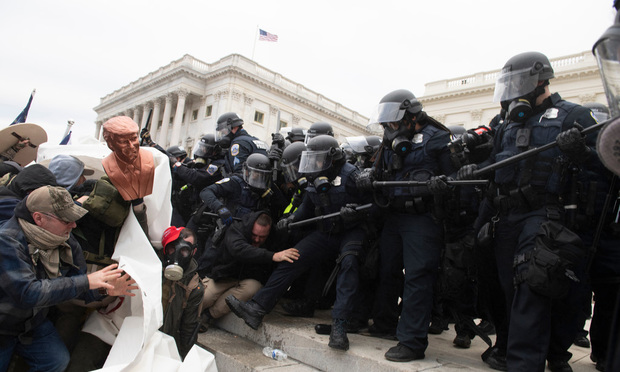 Rioters confront police at the U.S. Capitol on Jan. 6, 2021, in an attempt to prevent Congress from conducting the ceremonial counting of Electoral College votes. The disorderly mob left a trail of destruction and caused four deaths, approximately 140 injured police officers and resulted in federal prosecutors charging more than 500 people. (Photo: Gallagher Photography/Shutterstock)
Rioters confront police at the U.S. Capitol on Jan. 6, 2021, in an attempt to prevent Congress from conducting the ceremonial counting of Electoral College votes. The disorderly mob left a trail of destruction and caused four deaths, approximately 140 injured police officers and resulted in federal prosecutors charging more than 500 people. (Photo: Gallagher Photography/Shutterstock)
2021 has been the most active year on record for civil disturbances. The Chilean 'Social Outburst' protests spread throughout the nation, the Zuma protests in South Africa escalated into widespread rioting and looting, sporadic riots continue in Hong Kong, and then there was the extraordinary storming of the U.S. Capitol in January. These events, to name but a few, are part of a pattern of rising social tensions globally.
Recommended For You
Want to continue reading?
Become a Free PropertyCasualty360 Digital Reader
Your access to unlimited PropertyCasualty360 content isn’t changing.
Once you are an ALM digital member, you’ll receive:
- Breaking insurance news and analysis, on-site and via our newsletters and custom alerts
- Weekly Insurance Speak podcast featuring exclusive interviews with industry leaders
- Educational webcasts, white papers, and ebooks from industry thought leaders
- Critical converage of the employee benefits and financial advisory markets on our other ALM sites, BenefitsPRO and ThinkAdvisor
Already have an account? Sign In Now
© 2025 ALM Global, LLC, All Rights Reserved. Request academic re-use from www.copyright.com. All other uses, submit a request to [email protected]. For more information visit Asset & Logo Licensing.








